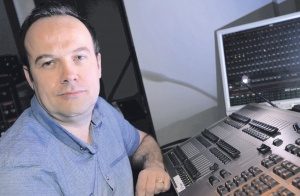Role: Technical Manager
Company: the MAC
Track Record: Creativity and patience are crucial in Simon Bird’s role as a technical theatre manager.
HOW I BECAME A TECHNICAL MANAGER
Give a brief outline of your career to date.
In my final year at the Royal Academy of Dramatic Art (RADA) I had an extended work placement at The Abbey Theatre in Dublin. Once my placement ended I worked for The Abbey and other companies in Dublin before moving to Belfast in 1994 to work for the Lyric. I was part of the Lyric’s stage management team until 2001. From there I went to the Island Arts Centre in Lisburn before I joined the MAC for its opening in 2011.
What was your favourite subject at school?
Drama.
Did you go on to further/higher education, if so what did you study and where?
I was accepted on the two-year Stage Management and Technical Theatre course at RADA, London in 1991.
How did you get into your area of work?
I grew up in a small town just outside of Swansea in South Wales and we had a very good youth theatre run by the local education department, West Glamorgan Youth Theatre. I joined the company when I was 16 and studying drama O level. The great thing is that they took on people who were interested in the technical side of theatre too, not just acting.
Is this what you always wanted to do?
Not at first. Nobody in my family was involved in theatre but after my first show with the West Glamorgan Youth Theatre I couldn’t wait to do another one. After a few years, I was spending more and more time working on shows so it became clear to me that this was a viable career option.
Were there any particular essential qualifications or experience needed?
There were no essential qualifications but you need to be highly organised and motivated.
Are there alternative routes into the job?
I took the Drama college route as I felt it would give me the best all round training. This would be my recommended route but I know there are some great apprentice schemes now run by Creative & Cultural skills. You’ll also find that there are people who have started out as crew on a show and then worked their way up.
What are the main personal skills your job requires?
Creativity, passion, patience, understanding, stamina, flexibility and humour are just a few things you need. You need to able to adapt to changing situations quickly and without getting stressed.
What does a typical day entail?
I’m responsible for the live events that go on in our two theatres. A large part of my job is meeting with clients and offering expertise to ensure we bring their ideas to life. I oversee a team of three full time technicians and a pool of casual staff. They work alongside me to rig and focus lighting, set-up and operate the audio for each event, we also assist in the construction of sets.
What are the best and most challenging aspects of the job?
The biggest reward is working with other creative people and seeing the reaction of an audience at the end of a show, seeing that you have touched people. The biggest challenge right now is funding. With the vote to leave the EU I can only see harder times for the arts. I fear in any post-Brexit deals the arts in Northern Ireland will not be factored in at all.
Why is what you do important?
During times like these, the arts has a vital role to play in holding the political classes to account and challenging society to be better. Having worked in the arts in Northern Ireland for the past 23 years I can say it’s an area where everyone is accepted and we would be much better off if other parts of our society functioned in the same way.
What advice would you give anyone looking to follow a similar career path?
Be prepared to work out of hours as this is not a 9-5 business and be willing to be adaptable. However, this is an incredibly rewarding career. I still love going out on a stage after the audience has left on an opening night of a play, it reminds me why I love working in this industry.
If you weren’t doing this what would you like to do?
Play rugby for Wales.
What is the one piece of advice you would give to yourself on your first day?
Listen!
Describe your ideal day off.
A lazy long breakfast followed by a match at Ravenhill and then a quiet evening spent with family and friends with good food and wine.
And finally, what’s the key to any successful job search?
Build your contacts as this industry still works largely on your reputation, get involved in small-scale events to gain experience and get noticed, and read the Stage and join Equity as they both have great jobs sections.


